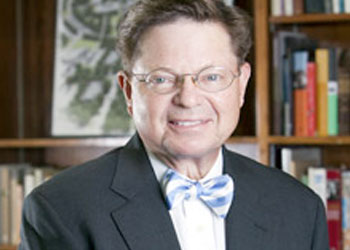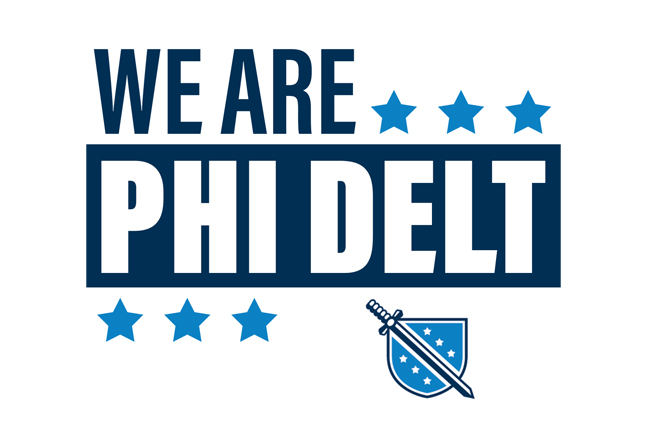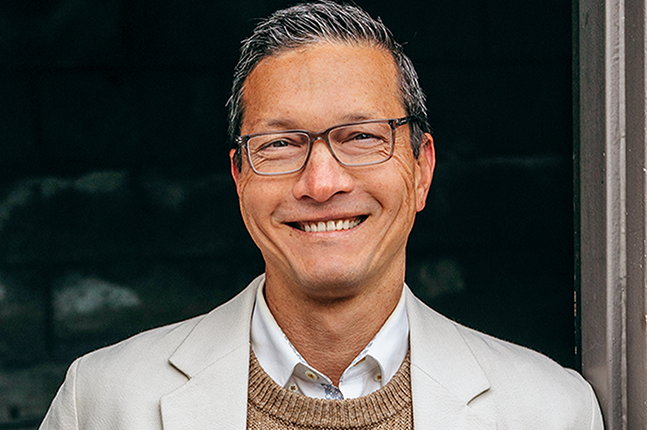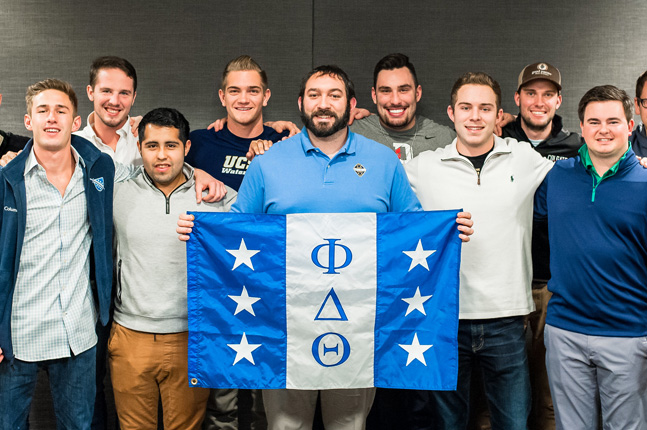By Dr. Donald Eastman – President, Eckerd Colllege
As delivered by Dr. Eastman at the 2012 Kleberg Emerging Leaders Institute
I am delighted to be with you tonight – and I hope perhaps to stimulate your thinking about both the true purposes of higher education and the emerging role of fraternities in accomplishing those purposes.
My remarks will be relatively brief, for two reasons: First, I simply want to kindle your thinking about this topic, not to do it all for you.
Second, recent findings from cognitive research show that after 9.6 minutes of listening to a talk, the old guys begin to nod off and the young guys begin to engage in sexual fantasy – and I want to keep both of these responses under control.
Just so you know where I am coming from, let me say this: I graduated from college in 1968, a time in which my classmates were being drafted to fight and die in Vietnam, a war I opposed from the start. My university and the country were still essentially segregated, and our school days were full of demonstrations and chanting and marches and civic disobedience and, occasionally, violence.
But my fraternity chapter provided diversity, debate, affection, and opportunities for thoughtful discussion and leadership that made a great difference in my life, then and now, and it has provided enduring friendships that are still strong. I am here tonight because I hope your experience is and will continue to be as rich and rewarding as mine.
As you know, these are tough times for American higher education – particularly public education.
State governments all across the country have cut their universities’ budgets again and again over the past decade: In Florida, public university support is now 40% less than it was five years ago. In many, if not most states, support for public higher education is often a lot less than it was ten years ago, and both tuition and enrollment have continued to increase, often dramatically. And, of course, many of these states were not funding higher education at an adequate level before they began these dramatic cutbacks.
Everybody wants colleges and universities to, in Senator Lamar Alexander’s words, “cut costs, reduce tuition, and improve quality.” And politicians across the political spectrum have ideas about how to do that. Senator Alexander, for example, former Governor of Tennessee and Secretary of the Department of Education, has frequently touted the benefits of a three-year degree program. Others talk about saving money through more accountability, larger classes, more part-time and non-tenured faculty, fewer on-campus amenities, and particularly what so many pundits and politicians and trustees think is the magic potion to control costs – on-line courses.
It is now almost universally accepted that on-line learning is just as effective as live classrooms with live professors, a whole lot less expensive, and inevitable. This idea has, of course, received widespread financial support from such icons as Bill Gates and Mark Zuckerberg, among others, and has been embraced by politicians and trustees who believe the failure to board the on-line train is evidence of professional protectionism by college faculty and administrators.
Perhaps you read about this exact scenario playing out last month at the University of Virginia, one of the world’s great public universities, when the Board of Trustees fired the president for being reluctant to demand that the faculty substitute on-line courses for their classroom teaching.
While UVA’s fiasco has been at least temporarily resolved, these battles are being fought in every state in the country, and the stakes for the form and support of higher education in America are very high.
At the same time, however, both private and public colleges and universities are enrolling more students than ever, and clearly people are paying higher prices than ever.
I understand the frustrations of politicians and parents and students about college prices and the inclinations of some of them to propose quick fixes. But for a first-rate college education, such fixes are not readily available: Despite the financial benefits, traditionally-aged students do not want to graduate from college in three years. They do not sign up for on-line courses if they can help it. They do not like large classes. They are frustrated by part-time faculty and courses taught by graduate students. (By the way, it is estimated that 70% or more of the undergraduate courses now offered at major public universities are taught by graduate students and temporary or part-time faculty.)
The unhappy truth is this: It still takes just as many people to play a Mozart quintet (that would be five) in 2012 as when it was first played in 1780. There has been no improvement in efficiency in the intervening 230 years, nor is there likely to be any.
You could, of course, omit an instrument or two, a violin here, a clarinet there – who would know? Well, those who know Mozart’s music would know. They wouldn’t think it was simply bad; they would think it wasn’t Mozart. And they would be right.
In the same way, most of our courses in higher education still require the same things Socrates required – an instructor, students, and a gathering place – actual or virtual. These elements are pretty much essential, if you are going to do it right.
The diminished funding of higher education is a bad thing for a lot of reasons – but the most important is that our future as the freest, most prosperous country on earth depends on it. Thomas Jefferson made this very point when he founded the University of Virginia 200 years ago. There is no question that the United States has both the best universities in the world and the best system of higher education in the world. Senator Alexander says that the greatness of our colleges and universities is largely the result of three things: the $100 billion a year in federal financial aid that supports need-based aid and loans; the $30 billion a year in federal research funding, mostly through the National Science Foundation, the National Institutes of Health and the Department of Defense; and our long American tradition of institutional autonomy. Unlike most countries in the world, we have almost no national colleges or universities, except for the five service academies.
Now, in the context of the state, national and world-wide economic downturn, which may not show great improvement for decades to come, undergraduates at American universities – especially public universities – are in a particularly difficult situation.
For public universities, educating undergraduates is only one of the many things they do, some of which are much more consequential to many of their constituents than undergraduate education.
Let me give you just four examples of those “other businesses.”
- First, the big universities are engaged in graduate education programs, training MA’s and PhD’s in a variety of disciplines. Many professors spend more of their time with their graduate students than they do with undergrads.
- Second, the big public and private universities are engaged in publicly funded research, to the tune of several hundred million dollars a year, and just as much non-funded research and scholarship. There is no question that this research has been essential to the economy and quality of life of our society. Much of what we now know as the Web, the iPhone, iPad, and Google, as well as the miracles of modern medicine, has resulted from research at universities. Google, for example, was the result of a digital libraries research grant from the National Science Foundation given to Stanford University in the mid-1990s. GPS’s were created by research at MIT, Harvard, and UC-Berkeley, funded by the Department of Defense. All of the key elements of the iPod – LCD monitors, lithium batteries, micro hard drives and microprocessors – were developed by federally-funded research at research universities. And so on . . . .
- Third, the big universities are engaged in mammoth intercollegiate athletic businesses – with budgets often exceeding that for their undergraduate teaching. At schools like Ohio State, Michigan, Texas, Florida, and Georgia, those budgets exceed $100M per year. This is a very large entertainment enterprise and obviously has great PR impact – positive and negative. Big-time intercollegiate athletics are a source of great pride and community- building, but very few schools break even on what they spend on such teams – and almost none of it has anything to do with a high-caliber undergraduate education.
- And fourth, the big universities are engaged, particularly the land-grant universities, in serving the agriculture and the agri-businesses of their states. And, Colleges of Engineering, Business, and Medicine, among others, often have fundamental connections and obligations to entities outside their universities.
So, big universities have a much broader portfolio and a much more complicated set of missions than liberal arts colleges do – but much of what they do, indeed most of what they do, has little or nothing to do with undergraduate education. Nevertheless, more than 80% of the undergraduates in this country are enrolled in our large public, research universities.
In contrast, small liberal arts colleges have a very different approach to higher education – primarily because their only business is the education of 18-22 year old full-time students. Consequently, such schools are able to focus their attention on undergraduates, within and outside the classroom, in a way that most research universities simply cannot. At my college, for example, all students have a close relationship with a faculty mentor; the student-faculty ratio is 13 to 1, and all classes are taught by professors, not substitutes; the average class size is 18 students; and nearly everyone has an internship, studies abroad, and lives on campus.
My point here is that, as state support for the large research universities continues to decrease, the out-of-class, residential, student life experiences that play such an important role in what we all think of as “college” will increasingly have to be developed and carried out by such extra institutional, long-term organizations as fraternities and sororities if they are to be provided at all. The same out-of-class academic and social growth and development that happen in the residential liberal arts college setting can also happen at the big universities perhaps only if fraternities and sororities make it their mission to make it happen.
I do not mean that ΦΔӨ should not continue to be a “social” fraternity: In fact, I mean that we need to employ the full dimension of that word, “social.” Indeed, social and emotional intelligence is just as – if not more – important than academic intelligence – more important for jobs, and for success and happiness in life. Understanding how to live and work with people, many of whom are different from ourselves, is an essential 21st century skill. Whether that difference is that the other is from some country town we never heard of, or that the other has different gender or skin color or religious or sexual orientation than we do, fraternities may be the last best place for learning these essential skills.
Social intelligence means knowing how to work in groups, with both efficiency and respect. It means knowing how to meet and present the self to strangers, how to treat colleagues, how to follow, and how to lead.
Such social skills require mentors and advisors and alumni supporters – and it is clear that the big universities are going to be doing less and less of this, just as they are cutting back in every other aspect of support for undergraduate education, which makes it so important that fraternities do more and more.
So there it is: I believe thoughtfully organized fraternities can satisfy an enormous need in the undergraduate experience that is simply no longer going to be addressed by big public universities.
The historical emphasis of fraternities such as ΦΔӨ on building positive relationships, on courtesy and good manners, on social grace and high morals, on community service and philanthropy are not, in any sense, the add-ons of a good college education: They are what a college education is all about. In our culture, the preferred manner of turning 18 year-old adolescents into 22 year-old adults is college – and what that means has less to do with whether one majors in chemistry or art than with whether one has learned how to make good decisions and how to be a responsible citizen.
I now believe that, given the changes in public support of higher education, it will be up to such organizations as fraternities to maintain the true mission of higher education.
I challenge you current students to consider these issues and the rest of us to assist and support you in that effort. If you young men and those who follow you are going to have the opportunities my generation had in college, you – and we – must work harder and smarter than we did than when we were in college.
As you know, these are also tough times for college graduates, and the better prepared you are, the better your social and academic preparation has been, the better your prospects for the future will be. I believe in being prepared. I believe in working hard. I believe, perhaps more than anything, in what my athletic coaches called, “hustle.”
You may have heard what I call the “hustle” parable:
Every morning in Africa a gazelle wakes up.
It knows it must outrun the fastest lion or it will be killed.
Every morning in Africa a lion wakes up.
It knows it must outrun the slowest gazelle or it will starve.
So, it doesn’t matter whether you’re a lion or a gazelle –
When the sun comes, up you’d better be running.





